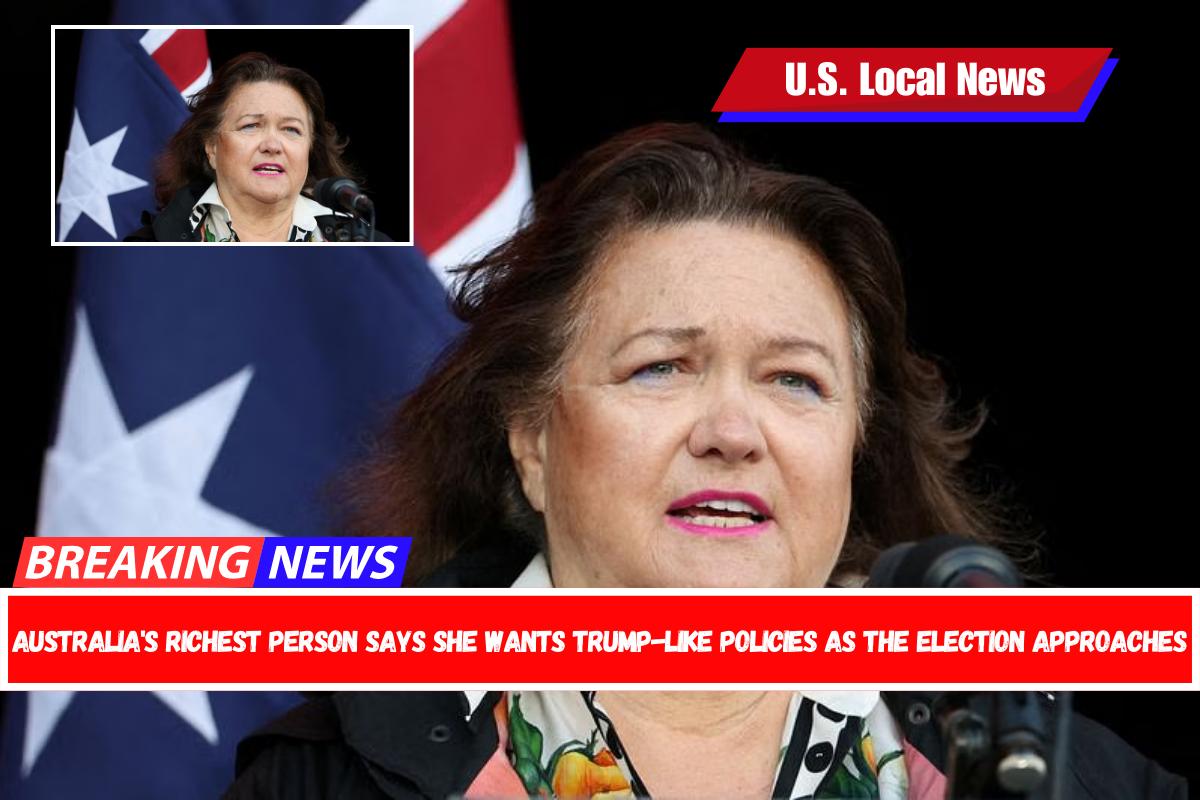MELBOURNE – Gina Rinehart, a mining magnate, is urging Australia to follow in the footsteps of the United States by implementing Donald Trump-style leadership to reduce government spending while increasing defense spending and energy security, as the country prepares to vote this weekend.
Rinehart, a vocal Trump supporter who attended the president’s inauguration party in Mar-a-Lago in January, told Reuters that rather than “whine and whinge” about Trump and his policies, Australia could benefit from a similar approach.
“Australia must reduce its costs, cut government waste and the expense of government tape, regulations, compliance, licenses…,” Rinehart said in exclusive comments to Reuters.
Rinehart is the richest person in Australia, with a net worth of $30 billion, according to Forbes. Hancock Prospecting Pty Ltd, her flagship mining company, is one of the largest donors to opposition leader Peter Dutton’s Liberal Party, with donations more than tripling to A$500,000 ($320,000) in the fiscal year 2024, according to Australian Electoral Commission data.
Voter concerns about the global fallout from Trump’s stop-start tariffs and volatile diplomacy appear to have harmed Dutton’s conservative coalition’s prospects ahead of the May 3 election, with polls in the final stretch showing Prime Minister Anthony Albanese’s ruling centre-left Labor Party easing ahead.
The trend is similar to what we saw in Canada this week, when Prime Minister Mark Carney’s Liberals staged a major political comeback, fueled by a backlash against Trump.
Rinehart stated that the consequences of Trump’s tariff policies could take several months to play out, noting that “more than 75 countries had asked to meet with U.S. Administration officials to negotiate on tariffs.”
Neither Dutton’s office nor the Labor Party responded to requests for comment.
Rinehart’s support for Dutton and Australia’s populist conservative movement is reminiscent of billionaire Elon Musk’s support for Trump, who is now a key adviser to the president.
Rinehart has not publicly sought a position in the Australian government, but she has proposed establishing a Department of Government Efficiency (DOGE) similar to Musk’s. She also wants Australia to withdraw from the Paris Agreement on climate change, as Trump did during his first term.
When Trump was inaugurated in January, Dutton led in opinion polls as Australians expressed dissatisfaction with the cost of living and housing affordability.
In the week following Trump and Musk’s arrival in the White House, Dutton criticized public servants hired as “culture, diversity, and inclusion advisers.” He later promised to establish a Ministry of Government Efficiency, but has since downplayed comparisons to Trump and his policies.
Rinehart suggested, without providing specifics, that in Australia, “the Left” was resisting public sector cuts because they benefited from bureaucratic favors.
“Perhaps not surprising, the Left is also opposed to Elon Musk and DOGE; would not they like to see this taxpayer drain reduced? No, certainly not those with snouts in the trough. And not those who are concerned that they will have to repay money that was wrongfully taken, or even face jail time.”
Dutton has proposed cutting approximately 41,000 non-frontline government jobs in Canberra, which Labor said was impossible given the number of jobs in the capital that met the criteria.
FOSSIL FUELS AND DEFENSE BOOST
Rinehart has been a vocal supporter of using fossil fuels to increase energy security and lower prices. During the Trump campaign, she was photographed smiling and wearing a sign that read “Drill Baby Drill.”
Dutton has been a strong supporter of natural gas, promising to incentivize more production and promoting nuclear power, in contrast to Labor, which is relying on renewables and batteries to reduce power costs and meet carbon commitments.
“Probably the biggest single government tape that needs to be on pause, so our economy has the chance to recover, is the Paris Accord,” Rinehart told reporters.
“Could it be that the American public are ahead of us, they understand that cutting the mining and export of fossil fuels brings less revenue, less jobs and opportunities,” according to her.
Last month, in response to questions that Liberal Party policies had not gone far enough for Rinehart on gas while maintaining a commitment to net zero emissions, Dutton said: “We will have points of difference with many people, but that does not mean it impacts your friendship or relationship with different business people.”
Rinehart last week called on Australia, a key U.S. security ally, to spend 5% of its GDP on national security, in line with Trump administration policies.
Labor has pledged to increase defence spending by A$50 billion over the next decade, but would need to more than double current levels to meet a 5% target.
Rinehart’s Hancock Prospecting disclosed for the first time in February a roughly $1.3 billion US investment portfolio, with many of the largest holdings in energy, mining, and rare earths companies – all of which are critical for defense and aerospace technologies.
According to a Reuters analysis of the top ten holdings, they are up 2.3% in the first four months of the year, compared to a 5.5% drop in the S&P 500, owing primarily to a 57% increase in shares of rare earths producer MP Materials.
“Americans may be ahead of us recognising they want strong leadership providing defence of their country and people, which President Trump is also busy doing,” Rinehart told reporters.
“Although, they may not want their taxpayers dollars and defence personnel’s lives risked to help allies who do not understand them, whine and whinge and worse, are incredibly rude to them, and who do bugger all to provide their own defence.”















